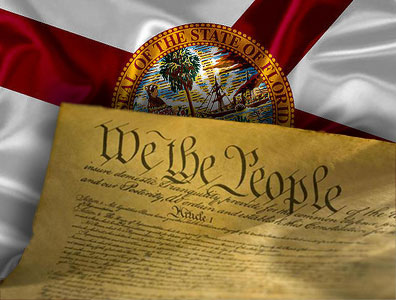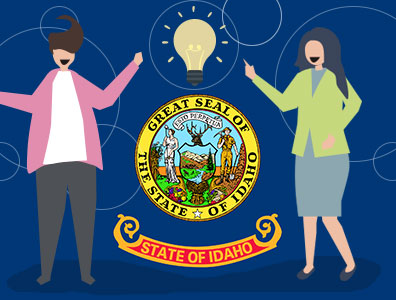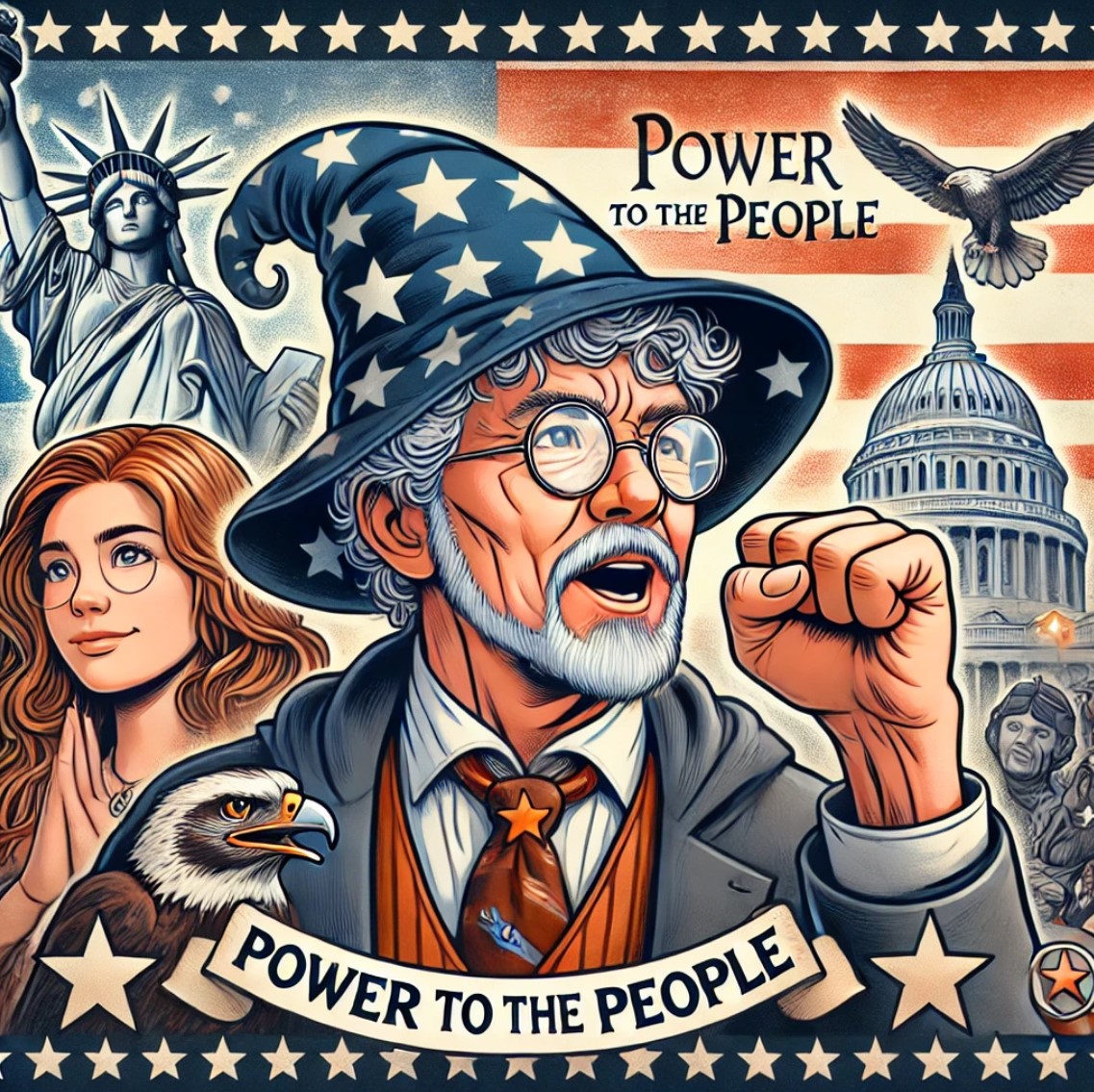On this page
Power to the People!
On this page
Introduction
What could be new in the world of gambling in the United States starting next year?
What I love about ballot measures is that they represent the closest thing that the United States of America has to a truly Democratic process, and in my opinion, represent what the Founding Fathers had in mind more than anything else. Anyone who has taken a High School Political Science course knows that we are actually a representative democracy, but usually once a year, the citizens get to vote on direct for state measures.
This is also the case with a wide variety of local measures, typically bonds and levies. The voters look up and down the ballot and decide whether or not the thing being funded is worth the cost of funding it. It’s essentially just a tax that you actually get to vote for or against.
Anyway, as gambling has spread beyond its early confines of The State of Nevada and Atlantic City, New Jersey, we have seen some measures pop up on the ballot so related. It’s kind of funny, also, because we get to see which states have more archaic measures, from a gambling standpoint, than others.
 Ohio Recommended Online Casinos
View All
Ohio Recommended Online Casinos
View All
Let’s take a look at what could be changing this year:
ARKANSAS ISSUE 4
From Ballotpedia:
Arkansas Issue 4, the Casinos Authorized in Crittenden, Garland, Pope, and Jefferson Counties Initiative, is on the ballot in Arkansas as an initiated constitutional amendment on November 6, 2018.[1]
A yes vote supports the initiative to authorize one casino each in Crittenden, Garland, Pope, and Jefferson Counties.
A no vote opposes the initiative to authorize casinos in Crittenden, Garland, Pope, and Jefferson Counties.
And, the spending:
| Issue | Spending For | Spending Against |
|---|---|---|
| Arkansas Issue 4, Casinos Authorized in Crittenden, Garland, Pope, and Jefferson Counties Initiative (2018) | $4,708,018.50 | $0.00 |
Okay, so apparently Ballotpedia has not found any actual spending against this issue, which I find mildly surprising.
Thinking back on casino issues and talks of gambling expansion in the State of Ohio, I recall hearing about how all things gambling would break down the moral fabric of society, something about the Fourth Horseman of the Apocalypse, who the hell knows? Anyway, it just surprises me to see this apparent reporting that no money has gone against a gambling measure.
That money has been dropped in favor of a gambling measure is no surprise whatsoever. I think we all know who might be plunking that money down! Hint, it starts with, “The,” and ends with, “Casinos.”
So, when it comes to an actual casino measure, the spending in favor almost always (probably always) outnumbers the spending against. In fact, the only exception I can think of is the 2016 ballot measures in New Jersey to expand casinos to the rest of the state.
Where you can see this:
| Issue | Spending For | Spending Against |
|---|---|---|
| New Jersey Allowance for Casinos in Two Additional Counties, Public Question 1 (2016) | $9,498,544.92 | $14,597,000.00 |
It should come as no surprise that many Atlantic City-based organizations and other organizations that rely upon AC tourism and those casinos doing well-poured money out against the measure. The New York Gaming Association opened its wallet, too, as casinos closer to the State of New York could hurt its business there, and by extension, the revenues flowing into the New York State coffers!
Here comes a surprise, the top three donors against had casino interests in New York State:
- Genting New York LLC $9,107,000.00
- Empire Resorts, Inc. $1,955,000.00
- Yonkers Racing Corporation $1,500,000.00
Either way, it’s just difficult to imagine that nobody wants to put up an effort, financially, to ensure that this doesn’t pass. I can’t fathom that there wouldn’t be anyone with a vested economic interest in a nay vote, so the assumption might be that nay wins easily.
On the other hand, two polls have shown completely opposite results. One poll has the measure winning by a pretty fair margin, while the other has it losing.
In my other recent article, you can see how much I trust these kinds of polls, so I’m going to call whether or not this ballot passes 50-50, it either will or it won’t. Either way, if the spending is ALL on one side, then that could bode well for it as we approach the final stretch and undecided voters might be swayed.
Also according to the Ballotpedia page:
The measure would grant Southland and Oaklawn automatic licenses to conduct casino gaming. The remaining two licenses would require applications and require applicants to pay fees to apply, demonstrate experience in conducting casino gaming, or a furnish a letter of support from the county judge.
Under the measure, for each fiscal year, casinos would be subject to a tax rate of 13 percent on the first $150,000,000 of net casino gaming receipts and a rate of 20 percent on net casino gaming receipts exceeding $150,000,001. Net casino gaming receipts are defined in the measure as "casino gaming receipts less amounts paid out or reserved as winnings to casino patrons." Under the measure, no other taxes could be imposed on casinos.
Hopefully, the casinos would offer some decent games, rules and paytables. Compared to what other states new to gambling have done in terms of revenue taxation, 13-20% is a really thin cut for the state to be taking. There also wouldn’t be any of those sneaky hidden taxes in there like West Virginia essentially has with the Greyhound Breeders Fund.
Reading further down the ballot, it looks like the state would even allow the casinos to comp liquor, which is something that they cannot do in states such as Ohio. That’s a good way to compete with the market down south, for sure.
FLORIDA AMENDMENTS 3 & 13
The language of the yes/no sounds a bit odd on Amendment 3:
A "yes" vote supports this amendment to provide voters, through citizen-initiated ballot measures, with the exclusive right to decide whether to authorize casino gambling in Florida.
A "no" vote opposes this amendment to provide voters, through citizen-initiated ballot measures, with the exclusive right to decide whether to authorize casino gambling in Florida.
Thus, you might mistake that as a “Vote to have a vote,” but you would actually sort of be right at the same time. In more detail, from Ballotpedia.
The readability score is above the pay grades of most people, myself included, as Ballotpedia suggests that someone would need twenty years of formal education to really read and understand it. In other words, post-graduate education.
Here is the part that I’m wrestling with:
The measure would provide voters with the "exclusive right to decide whether to authorize casino gambling in the State of Florida." Amendment 3 would make the citizen initiative process "the exclusive method of authorizing casino gambling," meaning the Florida State Legislature would not be permitted to authorize casino gambling through statute or through referring a constitutional amendment to the ballot.[3] In Florida, the number of signatures required for an initiative is equal to 8 percent of the votes cast in the preceding presidential election. Florida also has a signature distribution requirement, which requires that signatures equal to 8 percent of the district-wide vote in at least half (14) of the state's 27 congressional districts must be collected.

What I first thought was happening here is that it is a vote to allow the districts within the state to individually vote on it if they choose to do so after completing the, “Citizen initiative process.” This would take the power away from the Legislature, who could not independently do anything to authorize casino gambling and give the people the sole authority to vote on it. Furthermore, the Legislature wouldn’t even have the capacity to introduce it as an amendment on their own.
Upon reading it further, I think it literally is a vote to set up a possibility of a vote. I hope Florida resident BeachBumBabs will read this and perhaps clarify. It seems that interested parties could collect the required number of signatures, spread out across the required number of districts and then toss this bad boy on a future ballot.
Here’s the spending breakdown:
| Issue | Spending For | Spending Against |
|---|---|---|
| Florida Amendment 3, Voter Approval of Casino Gambling Initiative (2018) | $37,318,938.46 | $981,832.00 |
This is one where I’m not surprised to see so much spending for as opposed to spending against. The language of the ballot, at least to me, is such that those who are in favor are basically fighting just so that they can have the fight. In the meantime, those opposed know that they are not even fighting the real battle right now. The real battle will come if and when an Amendment to actually allow the casinos makes it to the ballot.
The biggest financial supporters are Disney and the Seminole Tribe because both entities like money. There are others who are opposed because they do not like money.
Florida Politics most recently says it has what it needs to pass handily.
This article also suggests the same.
Apparently, it needs a 60% supermajority to pass, but the polls indicate that it is well over. While we only have the polls to go on, it’s also possible that the polls are inherently biased if you look at where all the spending has been being done. Interestingly enough, it has been found that polls and the public perception therefrom often beget results.
Florida Amendment 13
The next Amendment in Florida concerns greyhound racing being held in the State of Florida and whether or not it can be wagered on, pretty simply:
A>"yes" vote supports prohibiting wagering on live dog races, including greyhound races, held in Florida and banning dog races in Florida on which there is wagering.
A "no" vote opposes prohibiting wagering on live dog races, including greyhound races, held in Florida and banning dog races in Florida on which there is wagering.
The effect of a, “Yes,” vote would not be felt immediately, also from Ballotpedia:
Beginning on January 1, 2021, Amendment 13 would prohibit pari-mutuel (a type of betting pool) operations from racing greyhounds or any other dogs for wagering. The measure would also prohibit persons in the state from wagering on the outcome of live dog races occurring in the state. Amendment 13 would authorize the Florida State Legislature to specify civil or criminal penalties for violating the constitutional amendment.[3]
This would give the tracks more than enough time to wind down operations and eventually close up shop.
My opinion is that the barbaric, “Sport,” of greyhound racing needs to be banned entirely, and I’m not wavering from that for a second. It’s completely inhumane.
It honestly is not even profitable. In the State of West Virginia, somehow still on the books, is something called the Greyhound Breeders Development Fund. The greyhound operations in the State of West Virginia haven’t even been profitable in decades, but having some sort of racing was one of the conditions for having casino gambling.
Anyway, this so-called, “Development Fund,” is really nothing more than a tax that essentially forces casinos to allocate some of their revenues to pay greyhound breeders and keep the greyhound operations going. Without this fund, greyhound racing would lose SO much money. The thing is, West Virginia makes next to nothing on simulcast betting being done on races in WV elsewhere, and almost nobody goes to the greyhound tracks anymore.
The other problem, in WV, is that the casinos are tied to the racetracks physically. In other words, the four casinos (one is private) are stuck where they are because they must have the racetracks.
It’s beyond my comprehension why greyhound racing hasn’t just died already, but alas, here we are. Let’s see where the money is going:
| Issue | Spending For | Spending Against |
|---|---|---|
| Florida Amendment 13, Ban on Wagering on Dog Races Amendment (2018) | $2,498,293.82 | $80,942.13 |
The only ones really against this bill, at least talking with their wallets, are greyhound breeders and a few scattered people who love the, “Sport.” Against, as one would expect, are animal rights organizations.
Unfortunately, it looks as though this amendment will fail.
The money side wants it to pass, so if the polling says that it’s in trouble, it probably is. Florida is a really weird state in many ways.
IDAHO PROPOSITION 1
Here are the simple Yes and Nos:
A yes vote is a vote in favor of this measure to legalize the use of video terminals for betting on historical horse races, also known as instant racing.
A no vote is a vote against this measure to legalize the use of video terminals for betting on historical horse races, also known as instant racing.
Basically, what this is Ballotpedia described quite well:
Historical horse race is defined in the measure as "a race involving live horses that was conducted in the past and that is rebroadcast by electronic means and shown on a delayed or replayed basis for the purposes of pari-mutuel wagering conducted at a facility that is authorized to show simulcast and/or televised races where at least eight (8) live horse race days are conducted annually." Historical horse racing, like live horse racing, is pari-mutuel, which is defined in the measure as "any system whereby wagers with respect to the outcome of a race are placed with, or in, a wagering pool conducted by a person licensed or otherwise permitted to do so under state law, and in which the participants are wagering with each other and not against the operator."

What this means is that people will be able, at horse tracks that host live horse races on at least eight days out of the year, to go in and bet on these video horse races. Essentially, they’re betting against one another on races that have already happened and then the house takes a cut of the action known as, “Vig.” It’s not a live race, but the way the betting works, it is basically treated as if it were a live race.
Idaho is honestly kind of back in time when it comes to gambling because this is the sort of measure you might have seen the states that currently have casinos have on the ballot in the 90’s. It’s honestly difficult to say how profitable this would even be. Let’s see where the money is going:
| Issue | Spending For | Spending Against |
|---|---|---|
| Idaho Proposition 1 | $3,448,186.65 | $2,947,669.72 |
That’s honestly more evenly divided that I would have expected, and I’m also surprised to see so much spending in such a small state over a relatively primitive form of gambling.
Interestingly, historical horse racing was once legalized in the state but was then repealed.
Treasure Valley Racing, it should come as no surprise, has contributed almost all of the spending in favor of this bill.
The betting is required to return ninety cents on the dollar to bettors, so that’s at least reasonably good. Unfortunately, I couldn’t find much in the way of polling, so I guess we’ll just see how this one goes!
MARYLAND QUESTION 1
First, let’s see what it does, simply:
A "yes" vote supports amending the state constitution to dedicate certain revenue from video lotteries to education as supplementary funding.
A "no" vote opposes this amendment to the state constitution to dedicate certain revenue from video lotteries to education as supplementary funding.
The way this works is that a certain amount of video lottery revenues, through 2023, would be specifically earmarked to education.

Most people know that when something gets, “Earmarked,” towards education, all it means is that they are using, “That money,” to spend on education as opposed to some other money. State Lotteries tout all the time that the money goes to education, but the truth is that the state would have to spend on education anyway, even in the absence of a lottery.
Either way, there’s still money that would be going towards education from other revenues, but I don’t have a problem with this Question or similar ones. If you don’t have gambling revenue, then that is potential revenue that a state is leaving on the table, so I think generating revenue is a worthy goal for states.
One interesting difference with this one is that they are very heavily laying down that these revenue contributions would have to be, “Over the state minimum,” education funding. In other words, these are earmarked and don’t count towards the minimum. My question, if I were a Maryland voter would be, were they not spending more than the minimum to begin with? If they were, then I don’t really see what this does other than effectively guaranteeing a new (and higher) minimum, which is fine. If they were not already spending more than the minimum, then this is excellent if you’re a fan of public education spending.
Here’s the spending breakdown:
| Issue | Spending For | Spending Against |
|---|---|---|
| Maryland Question 1 | $750,000 | $0 |
The spending is pretty minimal and funded entirely by the Maryland Promise Committee, an educational organization, who supports the passage. There does not appear to be any spending against reported by Ballotpedia.
I’d be hard-pressed to think of any real reason to vote against this.
MISSOURI AMENDMENT FOUR
This one is really simple:
A "yes" vote supports this amendment to: lower the time required that someone is a member of an organization to manage a bingo game for that organization from two years to six months and remove the constitutional ban on organizations advertising bingo games.
A "no" vote opposes this amendment to: lower the time required that someone is a member of an organization to manage a bingo game for that organization from two years to six months and remove the constitutional ban on organizations advertising bingo games.
It does what it says above. The language couldn’t be any more clear.
Citizens for Bingo spent a little over a thousand bucks on this.
My opinion on this one is, “Yeah, why wouldn’t you?” It seems kind of odd that the gambling enforcement is as strict as it is given that Missouri has licensed and regulated commercial casinos.
US States
Internal Links
- Comparing the Gambling Proclivities of the Countries
- Proclivity for Gambling (Part 1 of 2) The Most Gambling-Crazed States
- Proclivity for Gambling (Part 2 of 2) The Most Gambling-Crazed States
- Online Casinos for players from the US
- Online Gambling in the United States
- US Missing Untold Hundreds of Millions in Dollars




